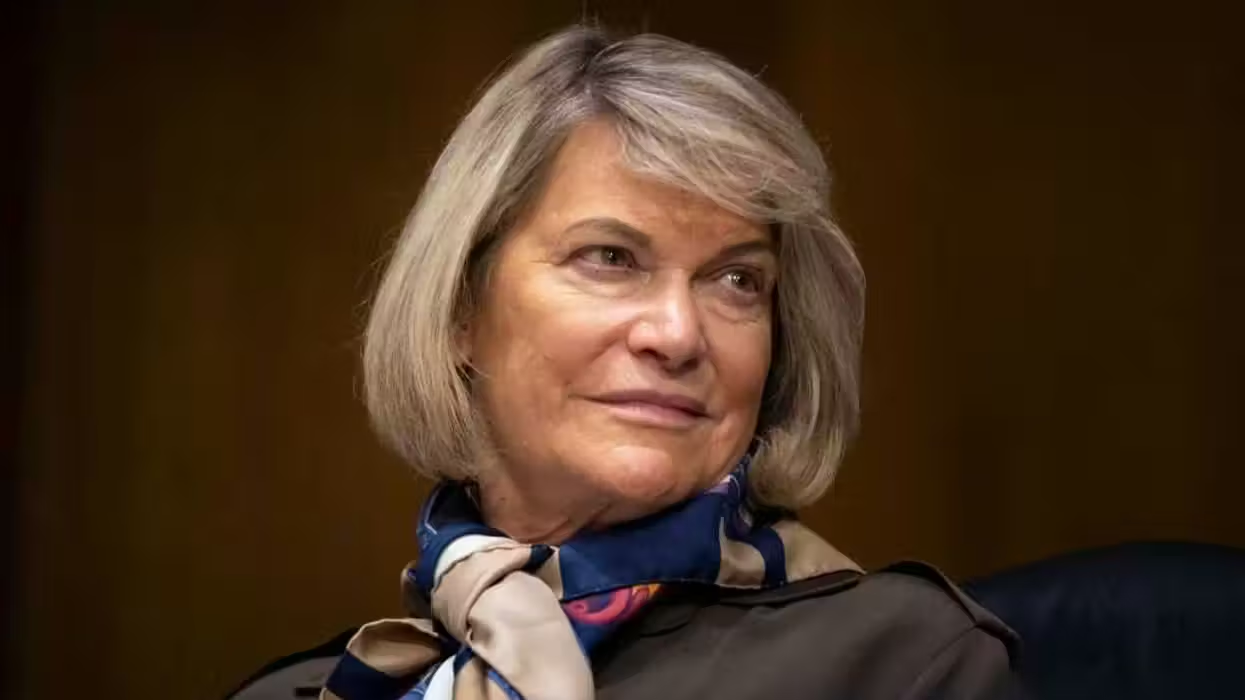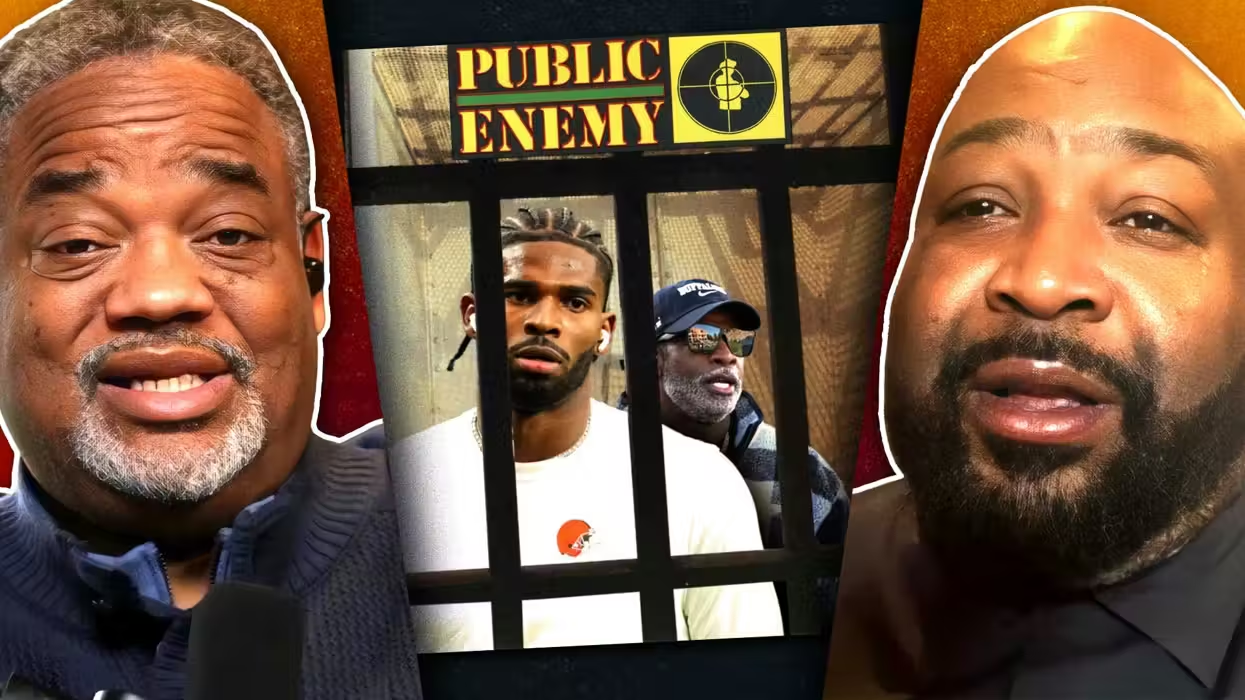
© 2025 Blaze Media LLC. All rights reserved.
Pope Francis Made Some Pretty Big Comments on the Global Economy: Here's What You Need to Know
November 26, 2013
"Screw capitalism"?
Pope Francis rebuked the culture of profit at any cost as he issued a 224-page mission statement for his papacy Tuesday, saying that mankind is called first to care for his neighbor and the poor.
"Money must serve, not rule!" reads Evangelii Gaudium (“The Joy of the Gospel”), the second major teaching document issued by Francis. "The Pope loves everyone, rich and poor alike, but he is obliged in the name of Christ to remind all that the rich must help, respect and promote the poor."
The document also denounced the survival of the fittest theory of economics "where the powerful feed upon the powerless" and the poorest in society are excluded.
“How can it be that it is not a news item when an elderly homeless person dies of exposure, but it is news when the stock market loses two points?” Francis asked in the document.
Unsurprisingly, as is the norm for this particular pontiff, some media outlets chose to present Francis’ words as an attack on yet another traditional pillar of "conservative" ideology: the free market.
[blackbirdpie url="https://twitter.com/MMFlint/status/405460810115190784"]
 Image source: Gawker
Image source: Gawker
 Image source: The New York Times.
Image source: The New York Times.
Now it's important to note that there is a clear difference between what some think is “capitalism” (they usually mean “crony capitalism”) and truly free markets. Francis, it would seem, denounced the former, which thrives on imbalances and is not support by free marketeers, while supporting the latter, which thrives on equality.
But let’s look at what Francis actually said in the document (all block quotes translated into English from the original Spanish via vatican.va):
3. No to an Economy of Exclusion
 Getty Images.
Getty Images.
Just as the commandment “Thou shalt not kill” sets a clear limit in order to safeguard the value of human life, today we also have to say “thou shalt not” to an economy of exclusion and inequality. Such an economy kills. How can it be that it is not a news item when an elderly homeless person dies of exposure, but it is news when the stock market loses two points?This is a case of exclusion. Can we continue to stand by when food is thrown away while people are starving? This is a case of inequality. Today everything comes under the laws of competition and the survival of the fittest, where the powerful feed upon the powerless. As a consequence, masses of people find themselves excluded and marginalized: without work, without possibilities, without any means of escape.
Human beings are themselves considered consumer goods to be used and then discarded. We have created a “disposable” culture which is now spreading. It is no longer simply about exploitation and oppression, but something new. Exclusion ultimately has to do with what it means to be a part of the society in which we live; those excluded are no longer society’s underside or its fringes or its disenfranchised – they are no longer even a part of it. The excluded are not the “exploited” but the outcast, the “leftovers”.
The following passage requires special attention as it has raised the most concern among free marketeers:
In this context, some people continue to defend trickle-down theories which assume that economic growth, encouraged by a free market, will inevitably succeed in bringing about greater justice and inclusiveness in the world. This opinion, which has never been confirmed by the facts, expresses a crude and naïve trust in the goodness of those wielding economic power and in the sacralized workings of the prevailing economic system.Meanwhile, the excluded are still waiting. To sustain a lifestyle which excludes others, or to sustain enthusiasm for that selfish ideal, a globalization of indifference has developed. Almost without being aware of it, we end up being incapable of feeling compassion at the outcry of the poor, weeping for other people’s pain, and feeling a need to help them, as though all this were someone else’s responsibility and not our own. The culture of prosperity deadens us; we are thrilled if the market offers us something new to purchase; and in the meantime all those lives stunted for lack of opportunity seem a mere spectacle; they fail to move us.
First, there's a problem of translation. In the original document, Francis included the phrase "por sí mismo," which roughly translates to "by itself," meaning "trickle down" economics by itself is not good enough to address the needs of the poor. Unfortunately, this was left out of the English translation.
 Image source: @ellencarmichael
Image source: @ellencarmichael
But let's forget about "por sí mismo" for a moment. If one is to rely on the English translation, it's still clear that Francis didn't call for governments to increase their presence in the market and he certainly didn't condemn the free market.
True, "trickle down” is more likely to benefit the poor than, say, socialism. But it is by no means an automatic guarantor of the type of justice and inclusion Pope Francis is referring to; that responsibility falls to the individual (because individuals are best suited to address individuals). "Trickle down" can increase wealth and offer more opportunities, but people are still responsible for people. That's Francis' whole point.
An economic system, whether it is government-run or free, it not enough to address poverty, according to Francis. People must care for people. To think that "trickle down" can by itself resolve poverty and starvation is, as Francis put it, "crude" and "naive."
And, again, Francis never said governments should force a particular economic theory on individuals. He merely called on governments to respect the dignity of the human person, which is hardly a controversial thing for a pontiff to say.
Lastly, the the Catholic Church has clearly stated in the past that it disagrees with the idea that industry or a particular economic theory somehow excuses individuals from their responsibility to care for one another. Francis isn't exactly breaking new ground.
2. No to the New Idolatry of Money
 Getty Images.
Getty Images.
One cause of this situation is found in our relationship with money, since we calmly accept its dominion over ourselves and our societies. The current financial crisis can make us overlook the fact that it originated in a profound human crisis: the denial of the primacy of the human person! We have created new idols. The worship of the ancient golden calf (cf. Ex 32:1-35) has returned in a new and ruthless guise in the idolatry of money and the dictatorship of an impersonal economy lacking a truly human purpose. The worldwide crisis affecting finance and the economy lays bare their imbalances and, above all, their lack of real concern for human beings; man is reduced to one of his needs alone: consumption.While the earnings of a minority are growing exponentially, so too is the gap separating the majority from the prosperity enjoyed by those happy few. This imbalance is the result of ideologies which defend the absolute autonomy of the marketplace and financial speculation.
U.S. taxpayers who were called on to bail out Wall Street would most likely agree with this statement.
Consequently, they reject the right of states, charged with vigilance for the common good, to exercise any form of control. A new tyranny is thus born, invisible and often virtual, which unilaterally and relentlessly imposes its own laws and rules. Debt and the accumulation of interest also make it difficult for countries to realize the potential of their own economies and keep citizens from enjoying their real purchasing power. To all this we can add widespread corruption and self-serving tax evasion, which have taken on worldwide dimensions. The thirst for power and possessions knows no limits. In this system, which tends to devour everything which stands in the way of increased profits, whatever is fragile, like the environment, is defenseless before the interests of a deified market, which become the only rule.
1. No to the Inequality Which Spawns Violence
 Getty Images.
Getty Images.
Today in many places we hear a call for greater security. But until exclusion and inequality in society and between peoples is reversed, it will be impossible to eliminate violence. The poor and the poorer peoples are accused of violence, yet without equal opportunities the different forms of aggression and conflict will find a fertile terrain for growth and eventually explode. When a society – whether local, national or global – is willing to leave a part of itself on the fringes, no political programmes or resources spent on law enforcement or surveillance systems can indefinitely guarantee tranquility.This is not the case simply because inequality provokes a violent reaction from those excluded from the system, but because the socioeconomic system is unjust at its root. Just as goodness tends to spread, the toleration of evil, which is injustice, tends to expand its baneful influence and quietly to undermine any political and social system, no matter how solid it may appear. If every action has its consequences, an evil embedded in the structures of a society has a constant potential for disintegration and death. It is evil crystallized in unjust social structures, which cannot be the basis of hope for a better future. We are far from the so-called “end of history”, since the conditions for a sustainable and peaceful development have not yet been adequately articulated and realized.
Today’s economic mechanisms promote inordinate consumption, yet it is evident that unbridled consumerism combined with inequality proves doubly damaging to the social fabric. Inequality eventually engenders a violence which recourse to arms cannot and never will be able to resolve. This serves only to offer false hopes to those clamouring for heightened security, even though nowadays we know that weapons and violence, rather than providing solutions, create new and more serious conflicts. Some simply content themselves with blaming the poor and the poorer countries themselves for their troubles; indulging in unwarranted generalizations, they claim that the solution is an “education” that would tranquilize them, making them tame and harmless. All this becomes even more exasperating for the marginalized in the light of the widespread and deeply rooted corruption found in many countries – in their governments, businesses and institutions – whatever the political ideology of their leaders.
Obviously, out-of-context statements and buzzwords like “inequality” have led many to believe that Francis is a supporter of far left economic theories.
But a careful reading of the above may prove that he is anything but. Indeed, it would appear that his message is this: Crony capitalism is a broken and unjust system that thrives on imbalances. Crony capitalism -- by definition -- relies on there being both winners and losers, and the losers, responding to human nature, recoil at the injustice of the situation. This deep-seated resentment eventually turns into violence and unrest. If you want to resolve the unrest, resolve the imbalances.
And none of this would seem to contradict the basic principles of free marketeers.
Self-described "Christian libertarian" and free market economist Deirdre McCloskey offers some perspective (via AEI):
Friedrich Hayek, the modern master of what people in the USA call “libertarianism” and what others call “real liberals,” once wrote an essay entitled “Why I Am Not a Conservative.” He was not a conservative, nor am I or Robert Nozick or Tom Palmer or Donald Boudreaux or Ronald Hamowy or John Locke or Thomas Paine or (the Blessed) Adam Smith.I am a Christian Liberal. That is, I believe on the one hand that in human affairs the best policy is to let people alone to exercise their creativity. Such creativity has made the modern world. We should take power away from the massive modern state, which so often follows the Other Golden Rule: Those who have the gold, rule. States are corrupted by the rich …
But on the other hand as a Christian I also believe that as a spiritual affair we should love God and love God’s creatures, that is, our neighbors as ourselves. (It is Jewish and Muslim law, too: Rabbi Hillel was asked to summarize the law and the prophets while standing one leg. His reply was: to love God , the commandments 1-4, and our neighbors, 5-10.) In consequence, unlike fatherly and unChristian liberals, I believe in helping the poor.
At a meeting libertarians/liberals last year in the Bahamas I expressed to someone what I thought was an axiom, “But of course we all want to help the poor.” He instantly retorted, “No: only if they help me.” It took my breath away. I want to help the poor, period, not only as part of an exchange … And my liberal part adds to my Christian duty: Help the poor really, not by making them unemployable by raising the minimum wage, or uneducated by forcing them into public schools, or violent and victimized by outlawing recreational drugs.
(As an aside: The "I'll only help the poor if they help me" mentality is a remarkably shortsighted business strategy. A healthy, thriving community is an excellent way to boost profits and secure the future of one's business. Enraged mobs of unemployed people, on the other hand, is an excellent way to lose one's wealth and eventually their head -- literally.)
In short, it does not appear that Evangelii Gaudium is an attack on the free market. Rather, the document, which is not a morally binding document proclaimed Ex Cathedra, appears to be a continuation of Francis’ oft-repeated call for Church and world leaders to help every member of society -- especially those most in need.
“The joy of the gospel fills the hearts and lives of all who encounter Jesus. Those who accept his offer of salvation are set free from sin, sorrow, inner emptiness and loneliness,” Francis said in the document.
“With Christ joy is constantly born anew. In this Exhortation I wish to encourage the Christian faithful to embark upon a new chapter of evangelization marked by this joy, while pointing out new paths for the Church’s journey in years to come,” he added.
--
Follow Becket Adams (@BecketAdams) on Twitter
This post has been updated.
[related]
From the blog: A conservative Catholic responds to Pope Francis
Want to leave a tip?
We answer to you. Help keep our content free of advertisers and big tech censorship by leaving a tip today.
Want to join the conversation?
Already a subscriber?
more stories
Sign up for the Blaze newsletter
By signing up, you agree to our Privacy Policy and Terms of Use, and agree to receive content that may sometimes include advertisements. You may opt out at any time.
Related Content
© 2025 Blaze Media LLC. All rights reserved.
Get the stories that matter most delivered directly to your inbox.
By signing up, you agree to our Privacy Policy and Terms of Use, and agree to receive content that may sometimes include advertisements. You may opt out at any time.






